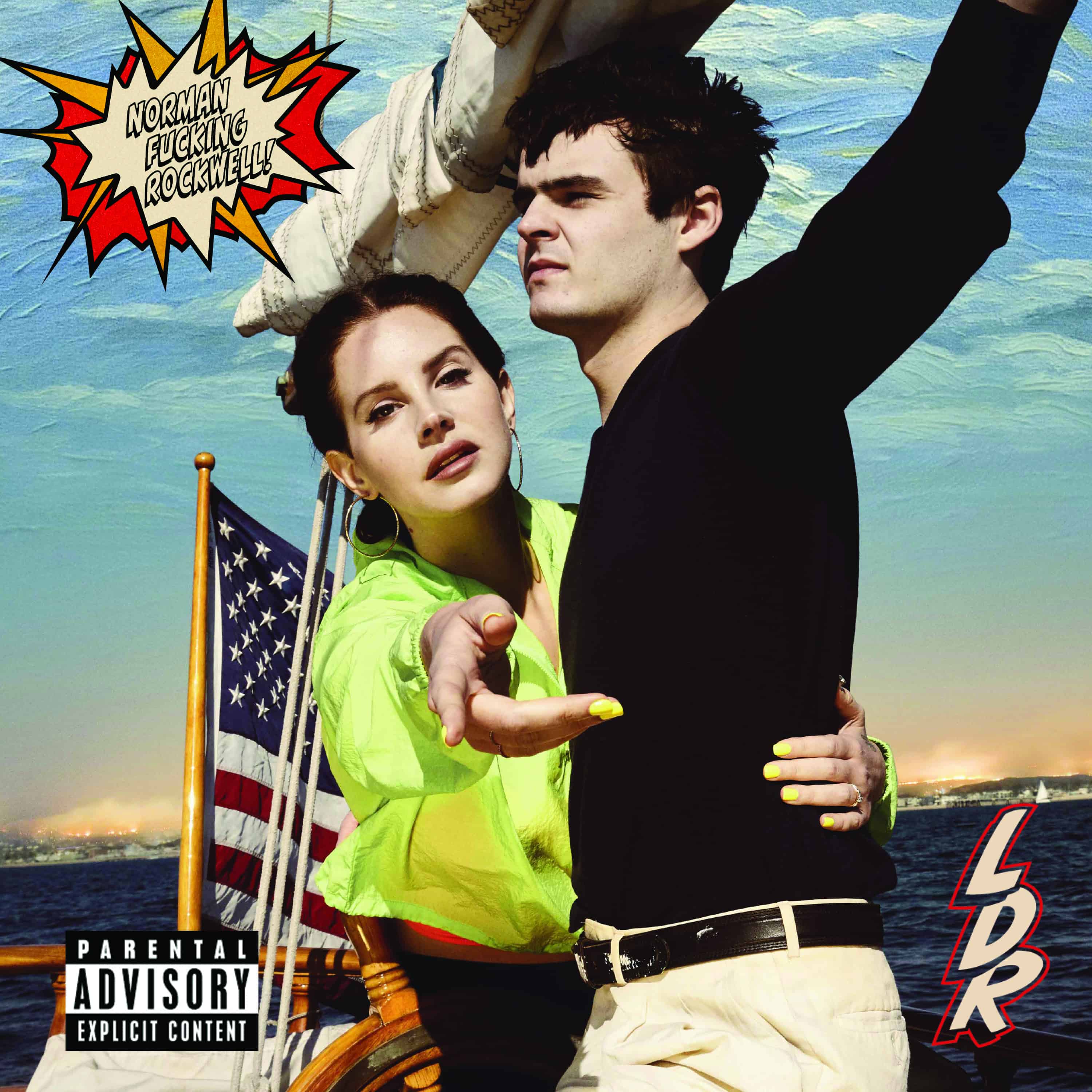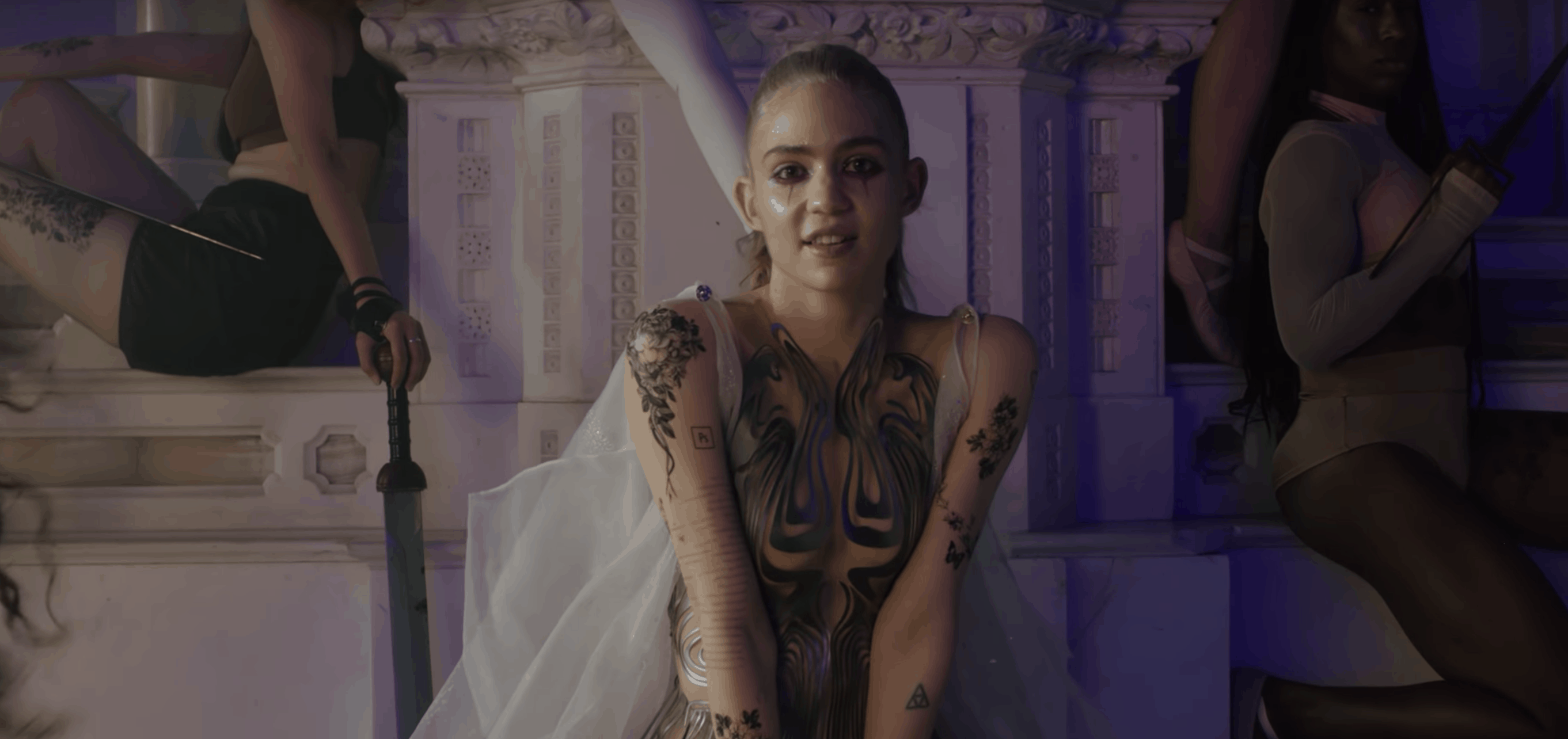“So this is the American dream, right now. This is where we’re at—Norman fucking Rockwell. We’re going to go to Mars, and [Donald] Trump is president, all right. Me and Jack [Antonoff], we just joke around constantly about all the random headlines we might see that week, so it’s a slight cultural reference. But it’s not a cynical thing, really. To me, it’s hopeful, to see everything as a little bit funnier. The chaos of the culture is interesting, and I’m hopeful that there’s room for there to be some movement and excitement within it.” – Lana Del Rey, Vanity Fair
At this point, you either feel the Lana Del Fantasy or you don’t.
There’s the “every song sounds the same, I don’t get it, she’s boring” camp. There are the ones who like her for that one “Summertime Sadness” remix and The Great Gatsby‘s “Young & Beautiful.” And then there are those that have sat back and enjoyed the ride from 2012’s Born To Die onward, finding meaning (and selfie captions) in every lyric and feeling the nostalgia in every note.
Born of grainy homemade videos, viral memes, blogger hype, Saturday Night Live mockeries and “industry plant” allegations, Lana Del Rey was supposed to fall as quickly as she started. She didn’t, nor did she even slightly falter by the time 2014’s stormy, black-and-blue masterpiece Ultraviolence rolled in. The darkness lifted (sort of), as she escaped the world by getting high by the beach, watching the boys and dreaming of space on Honeymoon a year later. But a gnarly political climate kept her spaceship grounded, and she became the unlikely ambassador of hope instead, providing (realistic) optimism and romantic reassurance with the socially conscious Lust For Life in 2017.
Two years later, there’s nothing left for Lana to do but take a cue from the sign hanging in your aunt’s kitchen and Live, Love, Laugh her way through the ludicrousness of the modern world – with a healthy dose of dark humor and, almost impossibly, hope.
To her dissenters’ credit, Lana Del Rey does have a signature sound: somber piano melodies, swelling strings made for movie soundtracks, surf guitar and psych-rock detours. Her lyrical toolkit is packed with well worn Americana imagery, geographical references stretching from the Hamptons to Laurel Canyon, and pop culture icons aplenty, from Old Hollywood stars to rock ‘n’ roll legends.
In short: we already have a vague sense of what we’re getting into when it comes to a Lana Del Rey album, sonically speaking. For those holding out hope that the 34-year-old singer-songwriter is going trance, or reggaeton, or klezmer – don’t hold your breath. (But then, you never know. She’s just done a song for the Charlie’s Angels soundtrack with Miley Cyrus and Ariana Grande, after all.)

This time, Lana teamed up almost solely with one of pop’s most in-demand producers Jack Antonoff who, a week prior, co-produced Taylor Swift‘s pop culture-dominating Lover.
Both albums are a testament to Jack’s talent as a collaborator: they don’t sound anything alike for the most part – although Taylor’s clearly found inspiration in Lana before. That said, both artists do have an easter egg-style approach to their songwriting: like Swifties, Lana fans will hungrily trace back terms like “cinnamon” and “blue” to older songs and dozens of leaked demos to find connections. It’s like any great work of art: you can take a Lana Del Rey song at face value, or dig deeper and find a universe of alternative interpretations and meanings.
Even if the production style hasn’t changed too drastically in nearly a decade, the artist’s outlook on life certainly has. In fact, it’s kind of funny to compare the opening line of Norman Fucking Rockwell!, released on Friday (August 30), to that of her 2011 major label debut single, “Video Games.”
“Swinging in the backyard, pull up in your fast car, whistling my name / Open up a beer, and you say ‘get over here,’ and play a video game,” she swooned all those years ago, dutifully doting on her bad baby.
Cut to the opening track and namesake of her sixth studio album: “Goddamn, man-child / You fucked me so good that I almost said ‘I love you’ / You’re fun and you’re wild, but you don’t know the half of the shit that you put me through / Your poetry’s bad and you blame the news, but I can’t change that and I can’t change your mood.”
Once putty in her man’s hands, Lana’s now a foul-mouthed savage, equipped with a kind of Fiona Apple snarl and a fucklessness that could only develop after years of being fucked over. Find a line this year that stings as bad as “Why wait for the best when I could have you?” Lana is hardened.
That’s not to say she isn’t still woozily, woefully enamored throughout Norman Fucking Rockwell!, a start-to-finish standout in an already sturdy discography. But our girlfriend’s back, and she’s cooler, and more cutting, than ever.
With just a handful of collaborators on this record compared to her more crowded full-length two years ago, Lana seemingly found more room to move on Norman Fucking Rockwell!. Then again, she knows she can get away with pretty much anything at this point, including her selfie-style single art submitted last minute via text, which she says pisses off her management…much to her delight.
The dreamy and sensual “Venice Bitch,” for instance, ousts “Cruel World” as her longest, most meandering song to date, clocking in at a casual 9:37 minutes in length. The track owes much of its runtime to a hazy instrumental break that sputters and whines as Lana moans in and out – “crimson and clover, honey” – providing an ideal soundtrack to an end-of-summer backseat make-out session.
“Oh God, miss you on my lips / It’s me, your little Venice bitch,” she lusts. It’s easily one of her horniest moments to date.
Speaking of backseat fun, Lana finds herself in the back of a car in one of Norman‘s purest moments: “Love song.” True to the advertising in the title, there hasn’t been a more quintessential Lana Del Rey love song in years – fast cars, party dresses, pleas for forever. It’s so captivating, and the melody is so classic – written in “about a half hour,” she revealed – that by the time the first utterance of “oh, be my once in a lifetime” arrives, you might be well past the point of choked up. A wedding song candidate? Quite possibly.
“It was one of those moments, kind of like when you meet a boyfriend, and you’re like ‘Oh my gosh, there’s something really good here.’ We should definitely keep working,” Lana said of writing the song with Jack, which led to their continued collaborations.
Those dreams of an eternal love are short-lived, of course. They had to be. It wouldn’t be a Lana Del Record without an excess of emotional turbulence. These men and their vices will always light her up and, inevitably, let her down.
The Neil Young title-sharing “Cinnamon Girl,” which perhaps doubles as a nod to one of Lana’s earliest works (“now my life is sweet like cinnamon” she once sang on “Radio”), sees our jazz singer sadly, hopefully yearning for the affection of a distant, pill-popping partner.
“If you hold me without hurting me, you’ll be the first who ever did,” she hesitantly coos. The fragile song turns into an un-Lana-like beast in its final moments, as ominous frequencies bubble up in the background, overtaking the strings with dooming beats, as if illustrating how their two souls clash.
Over and over again, Lana surrenders to the inevitability of disappointment in exchange for a fleeting rush of romance, even to the point of morbidity, if not slight gallows humor.
“If he’s a serial killer, then what’s the worst that can happen to a girl who’s already hurt?” she innocently wonders on another tender highlight, “Happiness is a butterfly,” a piano-led ode to an ephemeral love.
“All of the guys tell me lies but you don’t / You just crack another beer and pretend that you’re still here,” she sings to a love named John on the sauntering “How to disappear,” who, despite not being a liar, apparently can’t show up for Lana full-time. Then there’s Jim in the second verse, who’s too busy getting cut up from fighting and getting high with his friends. All of these boys keep slipping away. Can’t the girl just catch a break?
“I’m always going to be right here / No one’s going anywhere,” she calmly declares in the song’s final moments, only to reiterate the sentiment one song later on the lurching “California.”
“You don’t ever have to be stronger than you really are / When you’re lying in my arms,” she pledges. And if anything, that’s the underlying message of Norman Fucking Rockwell!: of all these pretentious, insecure, depressed men, Lana is the anchor that holds them down…or tries to, anyway.
Be it pop culture figures or past flames, Lana recognizes that men are a high volume, low value commodity, which is why, to no surprise, she steps in to wear the Blue Jeans and do the job herself.
“You’re lost at sea, then I’ll command your boat to me again / Don’t look too far, right where you are, that’s where I am / I’m your man,” she declares on “Mariners Apartment Complex,” inspired by a particularly disappointing exchange with a former fling. The Norman Fucking Rockwell! album cover feels like an illustration of this song in particular, as Lana holds out a hand to us while holding down Jack Nicholson‘s grandson, Duke.
She’s our man.
Lana also assumes the role of the man in her endlessly cool cover of “Doin’ Time,” one of the Songs of Summer ’19 recorded for the soundtrack of an upcoming Sublime documentary film produced by Interscope. It makes sense in a Norman Fucking Rockwell! context as well, as though from the perspective of the guys she’s singing about. After all, it’s not as if we ever get to hear from the other party in these doomed relationships.
The accompanying music video for “Doin’ Time” is an unexpected, cheeky homage to Attack of the 50 Foot Woman. Giant Lana exacts revenge on a cheater, hammering home the fact that, for as predictable as Lana’s music is sometimes criticized as being, she still has surprises tucked in the sleeves of her party dress to keep things spicy.
As displayed in “High by the Beach,” another one of her wonderfully WTF music video moments, Lana Del Rey isn’t very keen on sharing details of her love life beyond what she shares with her audience in her music, so paparazzi culture doesn’t exactly jive with her lifestyle. And so, she’s taking matters into her own hands to protect her personal life.
“I bought me a truck in the middle of the night / It’ll buy me a year if I play my cards right / Photo-free exits from baby’s bedside / ‘Cause they don’t know what car I drive / I’m just tryna keep my love alive with my bartender,” she sings on the tender, stuttering piano ballad “Bartender” (“Bar-t-t-tender…“), created with longtime collaborator Rick Nowels. Of course, now the cameramen will be on the lookout for a truck, Lana. Oh, well. It was a good idea while it lasted.
Of all the songs on Norman Fucking Rockwell!, there’s only one I take issue with – which, unfortunately, was one of my most anticipated tracks. (To be fair, it’s my own fault.)
In its demo form, initially thought to be the title track of Lust for Life years ago, “The Next Best American Record” is a sad, damning condemnation of a lover who got lost in his obsession with fame while writing his music. (“You did it all for fame, tell me how it treats you now,” she sings.)
In the new version, the rewritten chorus shifts the perspective, and the blame, to the both of them: “you were so obsessed” becomes “we were so obsessed.”
“Whatever’s on tonight‚ I just wanna party with you / Topanga’s hot tonight‚ I’m taking off my bathing suit / You make me feel like there’s something that I never knew I wanted,” she swoons. It’s a slightly devastating revision that strays from the theme of the album, although the song itself is still a stunner, from the subtle “Video Games” homage (“It’s you…“), to the Born To Die-esque production and yelps in the background, to the sick shattered glass in the bridge.
Then again, Lana isn’t perfect! Maybe she was as obsessed with writing that next best American record, and the revised lyrics are an accurate representation of their doomed situation. Who knows? We know too much about the song, unfortunately. Demoitis is a dangerous thing to have.
And so is hope, for that matter. In one of the most revelatory songs on the album – “hope is a dangerous thing for a woman like me to have – but i have it” – Lana echoes the sentiment of Lust for Life‘s “Get Free” and provides a realistic, live-through-this empowerment anthem while tearing around in her “fucking nightgown,” name-dropping Sylvia Plath and serving up quotable, endlessly relatable line after line: “Don’t ask if I’m happy, you know that I’m not / But at best, I can say I’m not sad.”
Any time Lana mentions modern technology in her music, it somehow underscores the silliness of how we communicate these days: “Hello, it’s the most famous woman you know on the iPad,” she deadpans.
As we enter into this Brave New World of TikTok stars and Instagram Lives, Lana’s become understandably burned out in trying to keep up with the culture. Who hasn’t? One of the album’s grandest moments, suitably titled “The greatest,” is a swelling tribute to what we’ve become and what we’ll never get back – and doubles, potentially, as Lana Del Rey’s swan song.
“The culture is lit and if this is it, I had a ball / I guess that I’m burned out after all,” she declares on the arena-ready anthem.
It’s funny: I never want anything to do with a bunch of dudes playing guitars at a bar, but the ache in Lana’s voice as she sings “I miss New York, and I miss the music / me and my friends, we miss rock ‘n’ roll” feels personally devastating. Me too, Lana. That’s the magic of Lana’s music: making complete strangers long for experiences they’ve never even experienced in the first place. Everyone’s got something from long ago that made them feel more alive than they do right now.
“I want shit to feel just like it used to.” God. Same, Lana. Same.
If Lana seems stuck on wistfully looking back, it’s only because focusing on the present is so frequently bleak: “Hawaii just missed that fireball / L.A. is in flames‚ it’s getting hot / Kanye West is blond and gone / ‘Life on Mars’ ain’t just a song / I hope the live stream’s almost on,” she sighs in the final seconds of “The greatest.”
That she’s dragging Kanye West for his recent behavior is especially pointed, considering she once sang at his wedding. But then again, Lana isn’t one to give a fuck – she won’t not fuck you the fuck up, period, as we already know.
If “The greatest” is to be believed, is Norman Fucking Rockwell! the end of the ride? Is she indeed burned out and signing off, bang bang kiss kiss, to become an Instagram baddie? She did openly ponder quitting music years ago, after all. And if she were to do so, she’d be ending on a high note.
But no, of course, it’s not over: in typical Lana fashion, she casually revealed during the Norman Fucking Rockwell! promo cycle that she’s in the middle of a follow-up record, which already has a title: White Hot Forever. It’s due in the next year or so – just in time to offer some solace in the middle of an inevitably ugly political battle next year.
Why? Because Lana Del Rey is nothing if not constant, chaotic good in a cruel world.
Over the weekend, I’ve seen publications proclaiming Norman Fucking Rockwell! to be one of her best albums – even her best. I don’t disagree, although I also don’t think Lana Del Rey has ever significantly faltered musically, either. It appears, at last, that she’s being taken seriously as a songwriter by the same snobs who tried writing her off long ago.
If anything, Lana seems to have struck a cultural chord at a time of pre-2020 election angst and social media oversaturation, echoing the sentiments of an increasingly disillusioned, depressed generation more than ever.
Despite operating relatively outside of pop culture, and despite not being a pop star (even though she’s treated like one by Stan Twitter), she has, all hyperbole aside, successfully paved a path entirely of her own and positioned herself as one of the defining voices of the modern American generation.
That sounds like a lot of pressure, but I honestly can’t think of a better man for the job.
This album is featured on the MuuTunes Spotify playlist. Subscribe!
You can also subscribe to MuuTunes on Apple Music.
Photo credit: Interscope Records






